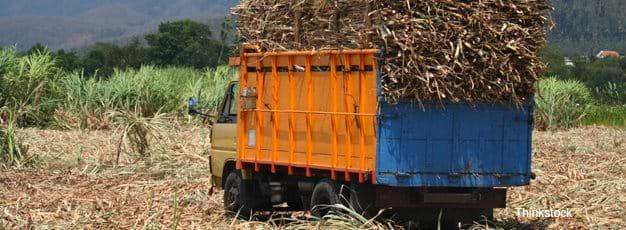
By Faith Tiza Mar, 19, 2022 Business
Nigeria's
sugar cane imports in 2021 reach N425.6 billion
Sugar cane imports in Nigeria increased by 61.31
percent to N425.6 billion in 2021, compared to N263.84 billion the previous
year and accounting for 2% of the country's import bill.
This is according to data from the National Bureau of
Statistics' foreign trade report (NBS).
This is the greatest amount spent on sugar cane
importation since Nairametrics began keeping track of the figures.
A closer examination of the data reveals that the
amount reported in the review year is 150 percent and 166 percent more than the
N170.14 billion and N160.14 billion respectively recorded in 2019 and 2018.
It's also worth noting that the sugar cane is primarily imported from Brazil,
which is the world's largest producer and exporter of sugar.
According to the NBS, cane sugar, which is utilized in
sugar refineries, is one of the primary goods consuming large FX resources in
the country. Sugar cane, in particular, had the second-highest import value for
food goods in 2021, trailing only durum wheat.
Background
History
In December 2021, the federal government, in
collaboration with the Sugar Backward Integration Program's operators, created
a $73 million intervention fund for sugar irrigation in Nigeria to enhance the
country's sugar production.
"The intervention involves the setting up of a 73
million-dollar irrigation fund for operators of the Sugar Backward Intervention
Program," Nigeria's Trade Minister, Mr. Niyi Adebayo, said.
"The purpose is to help improve irrigation
infrastructure on 10,000 hectares of sugar plantations in six locations: Numan
(Adamawa State), Sumti (Niger State), Lafiagi (Kwara), Bacita (Kwara), Toto and
Tunga, both in Nasarawa State."
He stated that the goal is to boost sugar yields
dramatically so that the National Sugar Development Master Plan can be
implemented, with the goal of Nigeria becoming self-sufficient in sugar
production and possibly becoming a net exporter of sugar.
"This would save the country the hefty foreign
exchange bill that it currently incurs for sugar importation," he said.
Vision
The Nigerian sugar sector has been consistently
lagging in recent years, resulting in a supply deficit in the country that
demands massive importation to close the gap.
Specifically, 93 percent (c.1.5 million metric tonnes)
of the expected annual sugar demand of c.1.7 million metric tonnes in 2020 was
imported.
The country's continued reliance on foreign imports is
putting greater pressure on the exchange rate by depleting the country's
foreign exchange reserves.
The federal government has attempted to achieve sugar
self-sufficiency through the National Sugar Master Plan (NSMP), but the project
has yet to make significant progress, as domestic supply still accounts for
less than 10% of yearly consumption.
In a similar spirit, the Central Bank published a
circular in 2021 indicating that only sugar refining enterprises that have made
significant progress toward an agreed-upon backward integration plan will be
permitted to get foreign exchange from the official window to import sugar into
the country.
These companies were BUA Sugar Refinery Limited,
Dangote Sugar Refinery, and Golden Sugar Company, according to the circular. Although
the apex bank instructed authorized foreign exchange dealers not to provide
foreign exchange to any company, including the three, without its prior and
express consent.
Implication
Despite extensive efforts by the federal government
and the Central Bank of Nigeria to promote growth in the sector and enhance
local output, Nigeria remains far from self-sufficiency in sugar production.
Nigeria has been hit by a foreign exchange constraint
in recent years, notably during the covid-19 outbreak, as inflows have
plummeted, causing the country's reserves to plunge until new external
borrowing was secured, bringing the reserve level back to over $40 billion.
Aliko Dangote, Africa's richest man and Chairman of
Dangote Sugar Refinery, indicated in 2021 that rigorous adherence to Nigeria's
sugar master plan might save the country $700 million in foreign exchange.
Tags: sugar cane imports central bank of nigeria national bureau of statistics import bill foreign trade sugar refineries irrigations sugar plantations
Share On Facebook Twitter Linkedin Whatsapp Telegram
Categories
Latest Post
- Nigeria Taps Global Markets with $2.25B Eurobond Sale
- Boeing Shares Rise as CEO Confirms China Deliveries to Resume Next Month
- STOCK SPOTLIGHT: UNION HOMES REAL ESTATE INVESTMENT TRUST (UHREIT)
- Nvidia Q1 2025 Earnings Report Summary
- 📉 U.S. Market Summary – May 28, 2025
- CBN Launches New Financial Tools to Boost Nigeria’s Non-Interest Banking Sector! ✨
- Market Watch: Key Updates as Wall Street Awaits Nvidia and Salesforce Earnings
- U.S. Equity Markets Rally as EU Tariff Deadline Is Extended and Consumer Confidence Surges
- Things to Know Before the U.S. Stock Market Opens
- What to Expect in the Markets This Week (May 27–31)

Start investing with Acorns today! Get $5 when you use my invite link: Z24WWE
